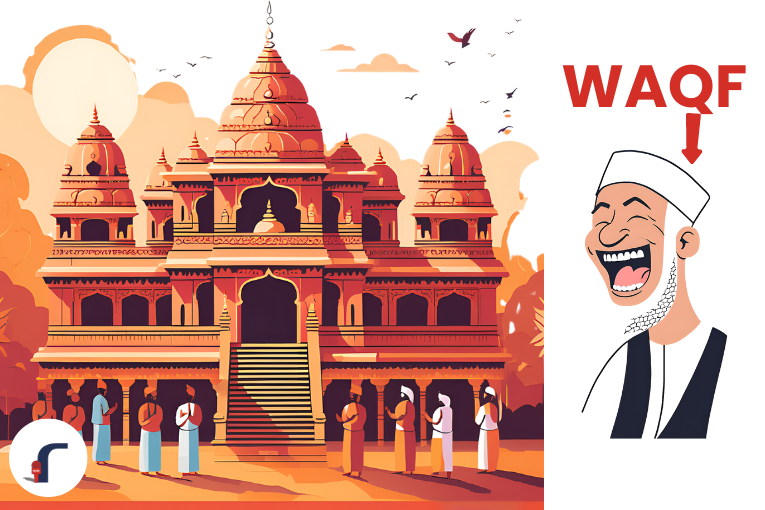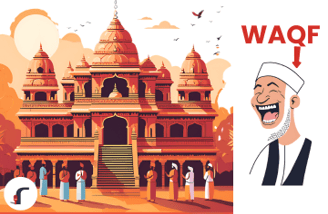Waqf Claims Hindu Temple in Delhi
Explore the controversy of 'Waqf claims Hindu temple Delhi,' where the Waqf Board claims ownership of 6 Hindu temples. Delve into the implications for religious fairness, land rights, and calls to ban the Waqf Board. Read more on Retrezar News.
HINDUTVA NEWS




The Waqf Board has sparked controversy yet again with claims over six Hindu temples in Delhi. A recent disclosure by the Minority Commission exposed the Waqf Board’s attempts to claim ownership of these sacred sites, raising significant questions about the board’s role and the preservation of India’s religious heritage. How does a body meant to manage Muslim endowments claim Hindu temples? What gives them the authority, and what does this say about the state of secularism in the country?
Related Story: Waqf Emergency in Karnataka
A Stark Revelation: Waqf Board’s Power Over Land
The Waqf Board’s power to claim land is vast. It can, as many have pointed out, randomly assert ownership over any land, including Hindu religious sites, without paying taxes. In a country where minority groups, particularly Muslims, are often portrayed as ‘oppressed,’ how is it possible for the Waqf Board to wield such influence over land ownership? This power dynamic has shocked many, especially as Hindu temples in a Hindu-majority nation continue to be heavily taxed.
The disclosure of the Minority Commission report shines a spotlight on a situation that seems to blur the lines of religious freedom, fairness, and governance in India. The Waqf Board, ostensibly an institution to safeguard and manage properties for the benefit of the Muslim community, now appears to be overreaching, leaving many Hindus and their sacred spaces vulnerable to claims they cannot fully contest.
Also Read: Dhirendra Shastri on Waqf Board
The Beauty of Secularism: Does It Work Both Ways?
India is often lauded for its secular framework, a principle that allows religious freedom and equality for all communities. But this situation raises a fundamental question: is secularism truly being practiced equally, or does it serve certain groups more than others?
Hindu temples, which serve as the cornerstone of cultural and spiritual life for millions, are subject to heavy taxation and government oversight. In contrast, the Waqf Board, which manages Muslim religious properties, does not pay taxes. This glaring imbalance has left many Hindus questioning the fairness of a system that taxes the majority religion while allowing minority institutions to flourish under government protection.
Is this truly the 'beauty of secularism,' or does it point to a deeper issue within India’s governance?
Also Read: Hindutva News
Ban Waqf and Save India from Land Jih@d
The term ‘Land Jih@d’ has been circulating in discussions about the Waqf Board’s unchecked power. For many, the fear is that the board's extensive powers will allow it to claim more and more land, potentially infringing on the properties of Hindus and other communities. With no taxes to pay, the Waqf Board holds an advantage that seems to go against the very concept of fairness in a diverse nation.
The call to ban the Waqf Board has gained momentum. Many argue that, like Article 370, the Waqf Act should be abrogated to prevent further misuse of power. The argument is that just as Article 370 was removed to integrate Jammu and Kashmir more fully into India, the Waqf Act should be removed to ensure that no religious body has disproportionate control over land and properties across the country.
Retrezar News has echoed these sentiments, urging the NDA government and Prime Minister Modi to take decisive action and abrogate the Waqf Act completely, protecting India’s land from what many see as encroachment and mismanagement.
Similar Topic: Rail Jihad
How Can the Waqf Board Claim Hindu Temples?
This question remains at the heart of the issue. How can an organization that is supposed to manage Muslim properties claim Hindu temples? The very idea raises serious concerns about the preservation of India’s rich religious heritage. Temples have stood as spiritual beacons for centuries, representing not only faith but the cultural identity of millions of Hindus. Yet, they are now vulnerable to claims that appear to have little legal or historical basis.
This situation highlights a deeper issue: what is the basis for the Waqf Board’s claims? How are these decisions being made, and is there any transparency in the process? Without clear answers, fears of more arbitrary claims will continue to grow.
What’s Next? A Looming Threat to India’s Land
At the current rate, many fear that the Waqf Board could begin claiming more land across the country, raising concerns about the security of private property and religious institutions. Will the board’s powers extend further, allowing it to claim every inch of land in India? This scenario, while extreme, reflects the growing anxiety surrounding the Waqf Board's unchecked authority.
Some have pointed out that the legal framework in place seems to favor those with influence, allowing them to shape laws that work in their favor. It’s a system that has left many Hindus feeling unprotected and vulnerable.
Political Complicity? Kejriwal & AAP’s Role
The political dimension of this issue cannot be ignored. Former Delhi Chief Minister Arvind Kejriwal and his Aam Aadmi Party (AAP) have come under fire for their alleged complicity in the Waqf Board’s growing power. According to some reports, the AAP government has donated significant funds to the Waqf Board, using it as a means to gain political favor and support. For Hindus, however, the AAP’s offerings have been more akin to a ‘1+1 scheme,’ leaving many feeling marginalized by their own government.
This situation reflects a larger trend in Indian politics, where minority appeasement often comes at the expense of the majority community. The shame of such governance is becoming harder to ignore, especially as more Hindu temples come under threat.
Conclusion: A Call for Change
The Waqf Board’s claims over Hindu temples in Delhi have ignited a firestorm of debate about fairness, religious freedom, and the future of secularism in India. With the power to claim land, pay no taxes, and exercise significant political influence, the board’s actions have left many questioning the state of India’s governance and the protection of its religious heritage.
For Hindus, the question is simple: how can their sacred spaces be up for grabs in a country where they are the majority? The call to ban the Waqf Board and protect India from what many see as ‘Land Jih@d’ is growing louder by the day. Retrezar News stands with those calling for change and urges the government to take swift and decisive action before it’s too late.
As the debate rages on, one thing is clear: India’s future as a secular democracy depends on the fair treatment of all its citizens, regardless of their religion. Whether that future includes the Waqf Board as it currently exists remains to be seen.
Related Post: Reject Waqf Amendment Bill 2024
